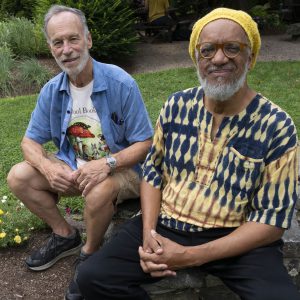Readers will no doubt be intrigued by the title of a new book from Olive Branch Press. “In Defiance” (248 pages, $25) is subtitled “20 Abolitionists You Were Never Taught in School.” True to the title’s promise (or almost so), I had heard of only one of the book’s subjects … and I didn’t know much about her.
The book is the brainchild of Tom Weiner of Northampton. Having spent decades teaching at the Smith College Campus School, Weiner dreamed of putting together a book like this for four decades.
He finally managed to produce it in April, in collaboration with Amilcar Shabazz. Shabazz, a professor at the University of Massachusetts, lives in Amherst.
The pair met several years ago in an organization called Bridge4Unity, which Weiner called “multi-age, multi-gender, multi-everything” in a recent telephone interview.
“The cementing of our relationship occurred when we went to Saint Helena [Island], off the coast of South Carolina,” he recalled. “We bonded over a mutual love of the sport of basketball and a commitment to social-justice causes.”
He explained that he did a lot of the writing while Shabazz “did a lot of editing and contributing from his incredible knowledge base.”
The figures portrayed in the book are mostly African American, although some white biographies are included. They are mostly centered in the 19th century although several earlier people are profiled.
These individuals didn’t all agree on a solution to the evils of enslavement. Nevertheless, all of them found ways to oppose that practice, “in defiance” of the norms of their day.
I asked Weiner how he identified the people he and Shabazz were to profile. “I went online and just searched,” he explained. “I was going for people who had less recognition.”
He wasn’t originally sure that there would be enough material about these people to chronicle their lives. “Almost always there was enough,” he said. “I was blown away by how much information there was because I expected nothing.”
“Every chapter had a surprise,” he added. “These stories were for me a labor of love, an experience in finding and unraveling the gems of their lives.”
Weiner hopes that the stories told in the book will inspire further research in their readers … and above all that they will inspire further work for social justice.
“I want activism to be inspired by people who defied a horrific history of enslavement for decades and centuries,” he concluded.
After Tom Weiner and I finished our conversation, I spoke with Amilcar Shabazz.
Shabazz expressed enthusiasm for the project and for the experience of participating in it.
“It worked in a way that has been very meaningful beyond just the scope of this project,” he noted.
He described his feeling that in recent years the traditional solidarity between Black people and Jewish people has begun to erode.
“I see these two communities that have both undergone, in this country and in the world, so many atrocities, so many crimes against humanity. And at different points in our history they have turned to each other.
“However, over the last years, as so much of our politics has become too corroded, we have not found, it seems to me, a way to learn from each other, support each other, and be more in solidarity with each other.”
He explained that he had not grown up knowing a lot of Jewish people and had relished the opportunity to learn about Weiner’s own history of feeling different from other Americans because he was Jewish.
Shabazz was taken by Weiner’s proposed project and by the idea of working with his Jewish friend. “We could be a bit of an example of bringing that kind of solidarity into view,” he explained.
“The partnership has been a deeply important one to me … It has helped me maintain my activism across the color line and helped me keep some hope alive in these dark times.”
Both Shabazz and Weiner found the stories of the lesser known anti-slavery figures in the book relevant in today’s world, particularly as forces in the U.S. government are trying to re-write American history to take out some of the Black stories and causes that are central to it.
Shabazz discussed the ways in which the language of the Revolution, the ideals of liberty and equality espoused by our nation’s founders, spoke to Black Americans.
“Black people were hearing all this talk … Black people were striving to be a part of the discourse. The first person who died in the Revolution was a Black, Indigenous man, Crispus Attucks,” he pointed out.
“[These stories] tell us lessons about today. It’s the thread, the connection from way back then to now…. They’re talking to us.”
To keep the dialogue between past and present going, Tom Weiner and Amilcar Shabazz are reading from their book as much as possible. They have been invited to speak to the Women’s National Democratic Club in the District of Columbia in October.
More locally (and sooner), the pair will talk about the book at the Northampton Senior Center on Wednesday, Aug. 20, at 1 p.m.
They will also speak at the First Congregational Church in South Amherst on Wednesday, Sept. 10, at 7 p.m. Anyone who wishes to pick up a book for the authors to sign at that event may purchase one discounted to $15 at Amherst Books.
Tinky Weisblat is an award-winning writer and singer known as the Diva of Deliciousness. Visit her website, TinkyCooks.com

